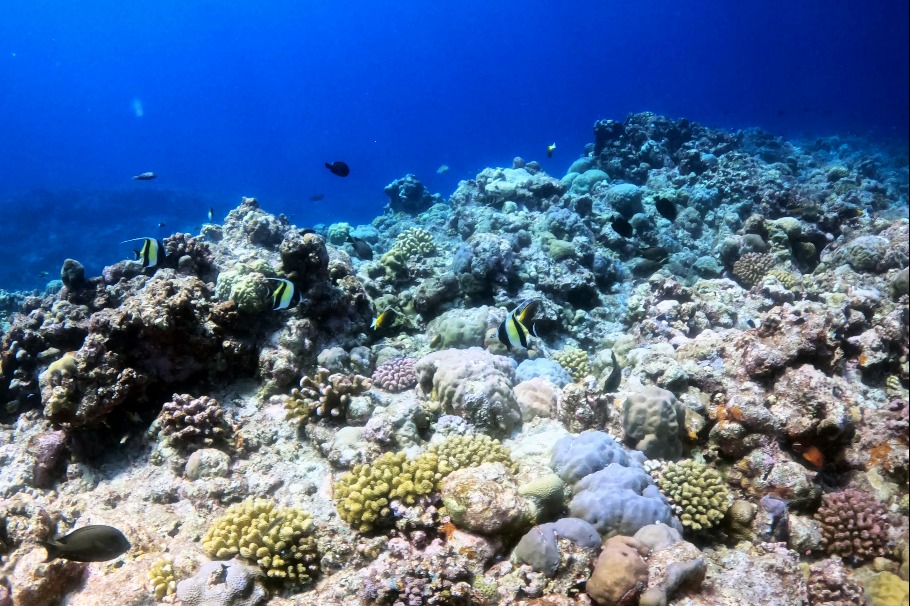Famous lake reflects its heritage
Students return to region to help guide visitors, patrol for problems, and protect its land and creatures, Li Yingxue reports in Hainan Tibetan autonomous prefecture, Qinghai.

At daybreak, Qinghai Lake shimmers in the first morning light. Along its quiet shoreline, Dorje Tsomo raises her camera to capture the moment — a daily ritual she performs before going to work as an ecological caretaker.
As a member of the Quanwan Ecological Protection Station of the Qinghai Lake Scenic Area Management Bureau, Tsomo patrols over 70 kilometers of lakefront that spans rivers, grasslands, woodlands, and scenic zones.
Each morning, she sets out with her notebook and bird guide, photographing and identifying unfamiliar species.
However, her work extends far beyond observation. She checks for overgrazing, land degradation, fire hazards from herders' winter stockpiles, and the impacts of human activity caused by litter and wastewater, and tourists venturing into core protected areas.
"The core zone is home to many wild animals and nesting birds," she says. "Only patrollers are allowed in. My job is to spot problems and solve them."
It's a responsibility the 27-year-old shoulders with quiet pride. For someone who grew up on these highlands and has always loved nature, it's nothing short of a dream job.
Qinghai Lake, situated in the northeastern part of the Qinghai-Tibet Plateau, is China's largest inland saline lake and a vital ecological treasure. Recognized as an internationally important wetland and a high-altitude biodiversity reservoir, conservation efforts have long been a focus.
The Qinghai Lake National Park completed its foundational work in recent years, and a new generation, including Tsomo, is taking the baton to safeguard and share the beauty of this vital highland ecosystem.
"Our station has more than 60 patrollers, many around my age. We walk the land of our hometown, using our feet to measure and protect it," Tsomo says.
Her unique career path into conservation was shaped by her roots. After earning a degree in education in 2023, she chose to stay close to home and join the ecological protection station. Her parents, local herders with 200-300 heads of cattle and sheep, supported her decision.
"This job is right at my doorstep. I can go home on weekends to see my parents. My income is 3,000 yuan ($418) a month," she says.
Patrollers aren't alone in this mission. Local herders also volunteer their time and knowledge to support environmental protection. "Sometimes they spot wildlife or environmental issues and send the information to us," Tsomo says.
Technology has also become part of their toolkit. "We use a WeChat mini-program to record patrol routes, and nearby villagers report injured birds promptly. Together, we protect Qinghai Lake — the home we all share."
She recalls working with volunteers to rescue an injured, nationally protected Upland Buzzard. Such experiences are part of why she's striving to learn as much as she can about the local biodiversity. So far, she's learned to identify more than a dozen of the 200-plus bird species that call the Qinghai Lake area home.
Beyond patrolling, Tsomo also engages in outreach — visiting schools to share the ecological value of the national park and using her fluency in Tibetan to educate local communities about wildlife protection and environmental laws.
"Protecting this environment is my mission. I hope more people will join us in safeguarding it," she says.
Tsomo has seen positive changes over her two years on patrol. "The biodiversity is recovering and the environment is gradually improving," she says. "For instance, some birds that didn't overwinter here in the past are now staying."
Tourism has also transformed the lake. "When I was a child, tourism wasn't as regulated or large-scale as it is now," Tsomo says.
At Qinghai Lake Scenic Area, a growing number of young people are following in Tsomo's footsteps, returning home after graduation to play a role in their birthplace's future. While Tsomo patrols the lake's fragile ecosystems, others are helping to protect and share its story in different ways, including through tourism.
Among them is 22-year-old A Kejuan, who studied tourism management at Qinghai Normal University. Last year, she spent four months at Qinghai Lake as a guide intern, leading visitors around its sweeping shores. This June, after earning her degree, she returned as a full-time guide, welcoming tour groups and independent travelers.
"I'm still in the learning phase. When I'm not leading a group, I follow the more experienced guides to pick up their skills. There are still many local legends, biological facts, and stories I'm unfamiliar with," she admits. "Visitors often ask many questions, like how deep the lake is or about local customs."
She has always enjoyed interacting with people and sharing stories, so this work suits her perfectly. Back in university, she participated in tour guide competitions. Now that she's stepped into the role for real, she's thrilled.
"Working as a guide, I realize how many unexpected situations can arise. Sometimes tourists ask very complex questions that I don't know how to answer yet," she says with a smile.
Her hometown is in Haidong city, more than 300 kilometers from Qinghai Lake. She remembers coming to the lake area as a child with her parents. As an adult, she's committed to systematically learning everything about this vast and storied lake.
"I've seen online reviews where visitors complained that the lake looked foggy, like they'd come for nothing. Maybe the weather wasn't great when they visited. But I think Qinghai Lake has a unique beauty in every type of weather," she says.
She also noticed a change in visitors' behavior. "Tourists are more environmentally conscious now. Plus, with our ongoing education efforts, their awareness of environmental protection is more consistent and proactive," she adds.
According to Xu Facheng, a staff member at the scenic area, the site has actively recruited local university graduates with tourism degrees in recent years.
During the busy summer season, they also partner with several Qinghai universities, including Qinghai Normal University, Qinghai University, and Qinghai Minzu University, to offer internships to tourism students.
"Last year, more than 70 university students interned with us. They not only helped ease the pressure during peak season, but they also have a deep emotional connection to Qinghai Lake," Xu says.
This year, in addition to hiring more guides, the scenic area opened a cultural product store to create jobs for young people while appealing to younger visitors with locally inspired creative goods.
It's not just through guiding tours that young voices are making an impact. Many are helping reimagine and share Qinghai Lake's cultural identity in fresh, modern ways.
Working at the store, 26-year-old Liu Xuejuan introduces visitors to Qinghai Lake's signature elements, such as the native scaleless carp (Gymnocypris przewalskii) and golden prayer flags, through thoughtfully designed merchandise.
"The designs are created by local university design students. This helps them earn some income and, at the same time, their fresh ideas bring a youthful energy to our products," Liu says.
"Our refrigerator magnets are very popular, especially the ones shaped like stamps, designs featuring golden prayer flags, blooming Gesang flowers, also known as Galsang flowers, and the native fish, Qinghai Lake's unique species. The magnets featuring Tibetan costumes also sell very well," she adds.
The shop also sells leather carvings and felt toys handmade by local herders, providing them with an additional source of income.
"Right now, there is just one store in the scenic area, but we're planning to open one in Xining too," Liu says. "Because these creative products can be taken everywhere by tourists, the stories and culture of Qinghai Lake will spread even further."




Today's Top News
- Initiative draws swift support across globe
- Healthy economic ties serve both sides
- China releases details of Huangyan Island nature reserve
- Xi congratulates president of Guyana on reelection
- Get the timing right to reduce 'debt cost' of natural disasters
- Advancing cooperation in global service trade urged






























